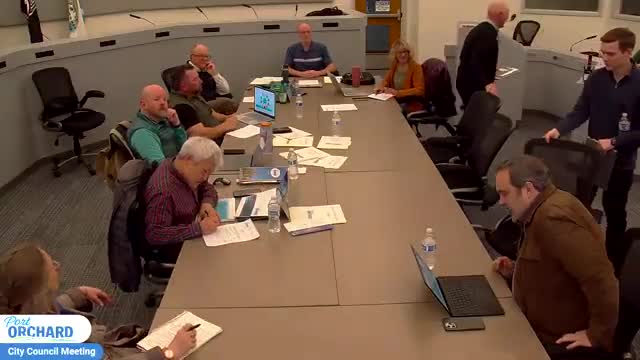Port Orchard code enforcement reports 148 active cases; staff outlines abatement process and assistance programs
Get AI-powered insights, summaries, and transcripts
Subscribe
Summary
Code enforcement officer Christine Cibiletti summarized the program’s complaint-driven approach, the dangerous-building abatement process, partnerships with Kitsap County agencies and a voucher program for illegal-dump cleanup.
Christine Cibiletti, Port Orchard code enforcement officer, briefed the City Council on March 18 on the scope of code enforcement work, case handling and enforcement tools.
Cibiletti told councilmembers that code enforcement is primarily complaint-driven and that the city starts non–life-safety matters with education and a courtesy letter. If a problem persists, she said, the city issues progressively firmer notices, and for dangerous dwellings the department follows the legal abatement process and coordinates with the city attorney.
Cibiletti described the dangerous-building abatement workflow and timelines. She said the city typically gives owners 30 days to at least start a remediation plan—submit plans, retain engineers or begin repairs—but that longer timelines can be granted if an owner demonstrates a reasonable plan. When the city abates a property, the cost is billed to the property owner and becomes a lien if unpaid; Cibiletti cited a recent 2023 abatement that cost roughly $54,000 and was billed to the property owner.
Cibiletti listed common complaint sources (citizens, other city departments, Kitsap County and Kitsap Public Health District) and identified enforcement limits: parking enforcement and landlord/tenant disputes are not handled by code enforcement. She also described a collaboration with Kitsap County that provides waste vouchers to help property owners dispose of illegal-dump materials; Cibiletti said the vouchers typically cover up to five tires and that the program has helped owners remediate properties that had illegal dumping.
On caseload, Cibiletti reported 148 active enforcement matters, with the largest share related to building and fire-code issues. She said civil penalties are used in long-running cases; since her arrival she estimated issuing about four or five civil penalties, mostly for building-code violations. The code officer also said that in some multi-year cases owners have voluntarily demolished or repaired structures after the enforcement process ran its course.
Councilmembers asked about timelines, city-owned properties and appeals to hearing officers. Cibiletti said appeals can be filed and are first heard by the hearing officer; if necessary, further appeals go to Kitsap County Superior Court. On city-owned structures, she said the city generally does not enforce code actions against itself and recommended the council consult Public Works or the city manager for city-owned assets.
Ending: Cibiletti said she will continue casework and that staffing (one open code-enforcement position) limits the department’s ability to do weekly sign-removal rounds; she answered council questions and said the department will return with updates as abatement matters progress.
